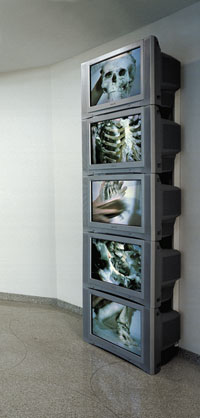9.3
Senior Years Activity
Performance as Art

Marina ABRAMOVIC
Yugoslavian 1946–
Cleaning the Mirror #1 1995
5-channel video installation with stacked monitors, with sound, edition 2/3
284.48 x 62.23 x 48.26 cm
Solomon R. Guggenheim Museum, New York
Purchased with funds contributed by the International Director’s Council and Executive Committee Members: Edythe Broad, Elaine Terner Cooper, Linda Fischbach, Ronnie Heyman, J. Tomilson Hill, Dakis Joannou, Barbara Lane, Peter Norton, Willem Peppler, Alain-Dominique Perrin, David Teiger, Ginny Williams, and Elliot K. Wolk
© Marina Abramovic/VG Bild-Kunst, Bonn. Licensed by VISCOPY, Australia
98.4626
For |
Senior Years Students |
Curriculum |
VCE Art |
Aim |
To explore the concept of Performance Art. |
Preparation |
To do this activity you will need:
|
Research Questions |
|
Group Task |
How is performance an effective method for Marina Abramavic to communicate her ideas and concerns? What is the role or value of documentation in performance art? Where do you think the value lies: in the performance or in the documentation. |
Discussion Questions |
Consider this excerpt from the exhibition catalogue: The body has always been her subject and medium. Exploring the physical and mental limits of her being, she has withstood pain, exhaustion and danger in the quest for emotional and spiritual transformation. This particular blend of epic struggle and self-inflicted violence was borne out of the contradictions of her childhood: both parents were high-ranking officials in the government, while her grandmother, with whom she had lived, was a devout Serbian Orthodox. Though personal in origin, the explosive force of Abramovic's art spoke to a generation in Yugoslavia undergoing the tightening control of Communist rule. How might Abramavic's heritage have shaped her performances or choices of subject? |